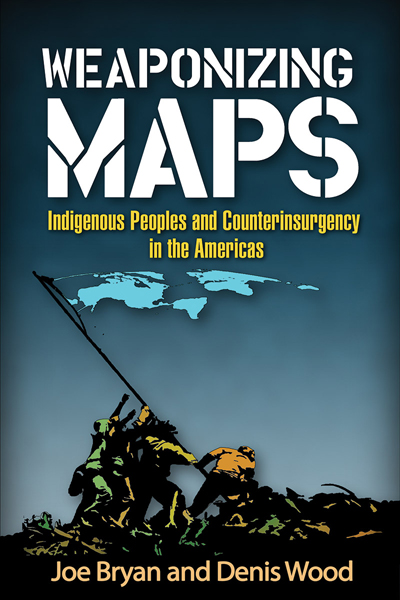
Weaponizing
Maps:
Indigenous Peoples and
Counterinsurgency in the Americas
by Joe Bryan and Denis Wood
The Guilford Press, 2015
Dual-use technologies – those with both military and peaceful applications like nuclear programs, information technologies or GPS – offer sly pathways for normalizing the encroaching militarization of the civilian sphere. Acknowledging their potential lethality, the US regulates cross-border distribution of the more sensitive of these, as in the case of controls that restrict export of nuclear fuels or certain strong encryption products.
Couched in claims of collateral civilian benefit, Pentagon kickstarters that reward dual-use research in the sciences prove irresistible to fund-strapped universities, where, in recent years, faculty submit to an increasingly corporatized business model and crushing debt makes graduate students compliantly meek research assistants. Land-grant colleges like the University of Kansas have a special historical relationship to state militaries, founded as they were during the 19th century by the sale of federal lands seized from indigenous occupants, under charters that specified military science along with agriculture as core courses of study.
What of dual-use research in 'soft' scientific disciplines like the academic social sciences? The role of psychologists as black site operatives in the US war on terror's marquee torture program, rebuked in the years following 9/11, was recently revisited by a report outlining how “the American Psychological Association secretly collaborated with the administration of President George W. Bush to bolster a legal and ethical justification for the torture of prisoners".1
In Weaponizing Maps: Indigenous Peoples and Counterinsurgency in the Americas (The Guilford Press, 2015) geographer Joe Bryan and independent scholar Denis Wood construct a granular context for the overt and covert militarism driving provocative research projects within the disciplines of academic geography. The authors' meticulous narratives expose witting and unwitting academic support of the US military's preemptive campaign to transform terrains that sustain the Americas' indigenous peoples and their uniquely communal way of life into battlespace, the data-omniscient operational environments of future war.
With the discipline of geography freighted by genealogical markers of its tainted origins as tool of 19th century Europe's imperial plunder, and cartography a premier technology enabling conquest, critical interventions by watchdogs like Bryan and Wood erect bulwarks against fraudulent claims of liberatory intent when geographers cynically deploy techniques like participatory research mapping to putatively advance indigenous rights to land, resources and self-determination.
Bryan and Wood excavate a vast trans-boundary transect to interrogate the multi-layered construct “the Americas”, delaminating an archeology of US proto-counterinsurgency during 19th century Indian Wars and early 20th century occupations of Nicaragua, tracking the origins of participatory mapping in contemporary struggles for indigenous rights from Canada to Central America. Along the way, unrepentant social scientists, disingenuous academic institutions and shell professional associations are revealed operating in the trenches as defense contractors by any other name, geopirates funded by and serving the interests of emerging US military counterinsurgency initiatives.
In the post-9/11 era's endless and lucrative war on terror, US security doctrines of preemption embrace a vision of the technological sublime that configures the globe as ubiquitous battlespace, an operational environment invested in militarizing each and every captured pixel and byte of human, informational and topographic intelligence. Beyond set-piece landscapes of obsolescing conventional warfare lies the battlespace of irrational terrain where counterinsurgency theories and technologies are being honed to prosecute small wars - whether in Iraq, Afghanistan or the narcotrafficstans and rebel borderlands of Honduras, Mexico and Nicaragua.
The conquest of outlaw spaces through methodologies of applied human geography and mapping's rationalizing technologies supports the imposition of boundaries, property lines and titles. Such grooming of unruly spaces and savage tribal populations yields counterinsurgency's neoliberal payoff: establishing compliant property frameworks for market privatizations that exploit global terrain as sites of wealth optimization and wealth extraction benefiting the absentee profiteer at the expense of indigenous occupant.
Scholar Silvia Federici has made the innovative argument that capitalism emerged as a violent counter-revolutionary project targeting 13th through 16th century heretical peasant rebellions – anti-feudal struggles that had been mounting increasingly successful challenges to the dominant powers of Catholic Church and the militarized nobility that was the feudal State.2
A key strategy of the mercantile counterinsurgency was the decimation of peasants' collective way of life through Enclosure of their hereditary plots of land and shared commons – the appropriation and privatization of vital subsistence resources of forest, pasture and lake – effectively redacting inchoate spaces of collective resistance. Federici points out that the European mercantile counterinsurgency could not have been perfected without the colonization of the Americas, through vital lessons learned from the subjugation and extirpation of indigenous peoples and plantation slavery's zero-wage labor model.
Weaponizing Maps exposes compromised mapping as a tool of latter-day campaigns of Enclosure. In the neoliberal hands of expeditionary social scientists, paramilitarized mapping is carrying on the unfinished project of the conquest of the Americas.The authors' thoughtful postscript “A Note on Maps” considers the way forward, encouraging the swarming proliferation of authentically creative strategies to reimagine liberatory spatial knowledge.
2 Federici, Silvia. 2004. Caliban and the Witch: Women, The Body, and Primitive Accumulation. Brooklyn, NY: Autonomedia.